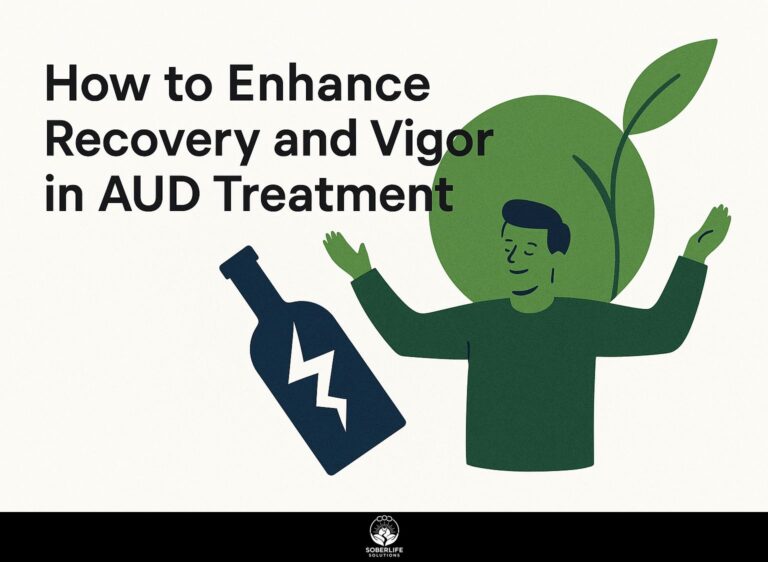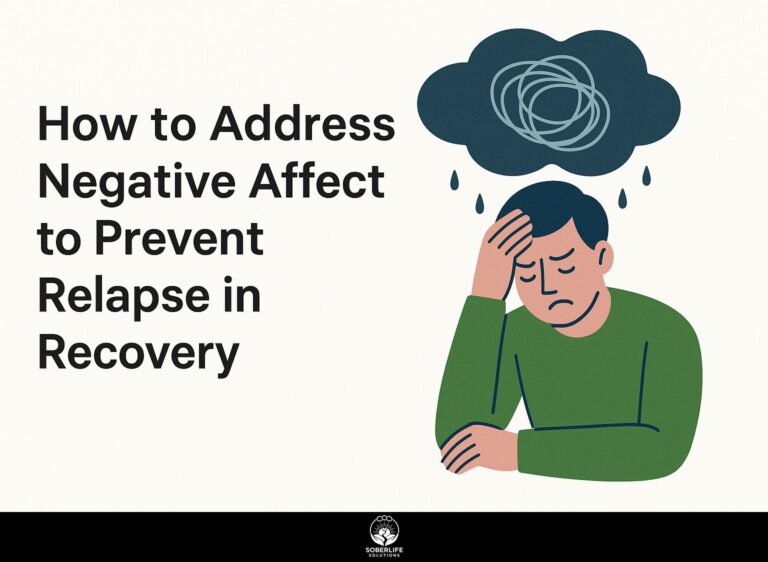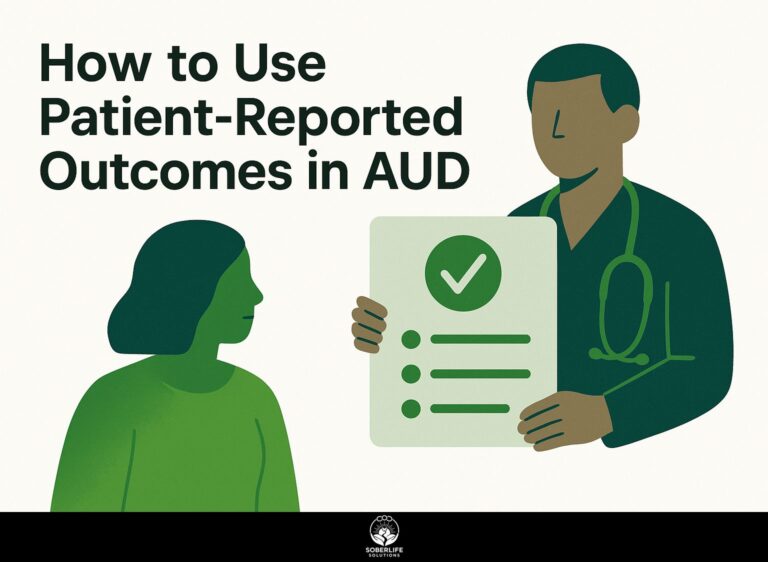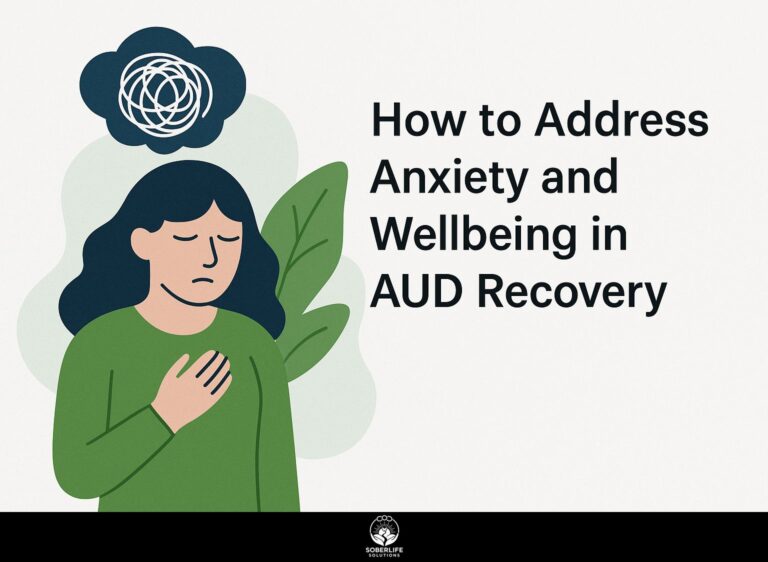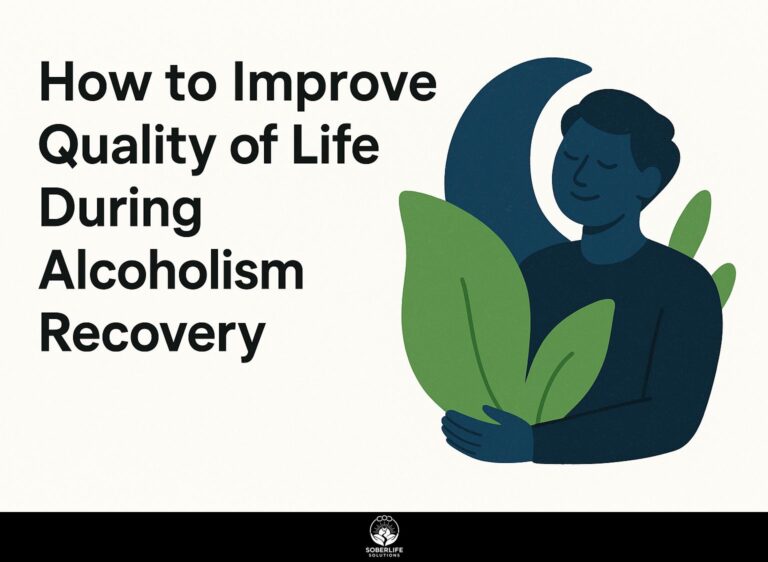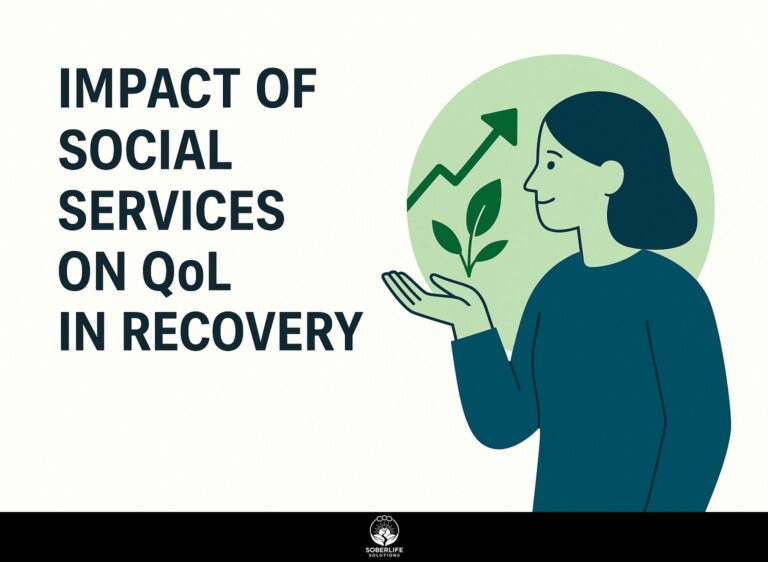Alcohol Dependence and HRQoL: Treatment Implications
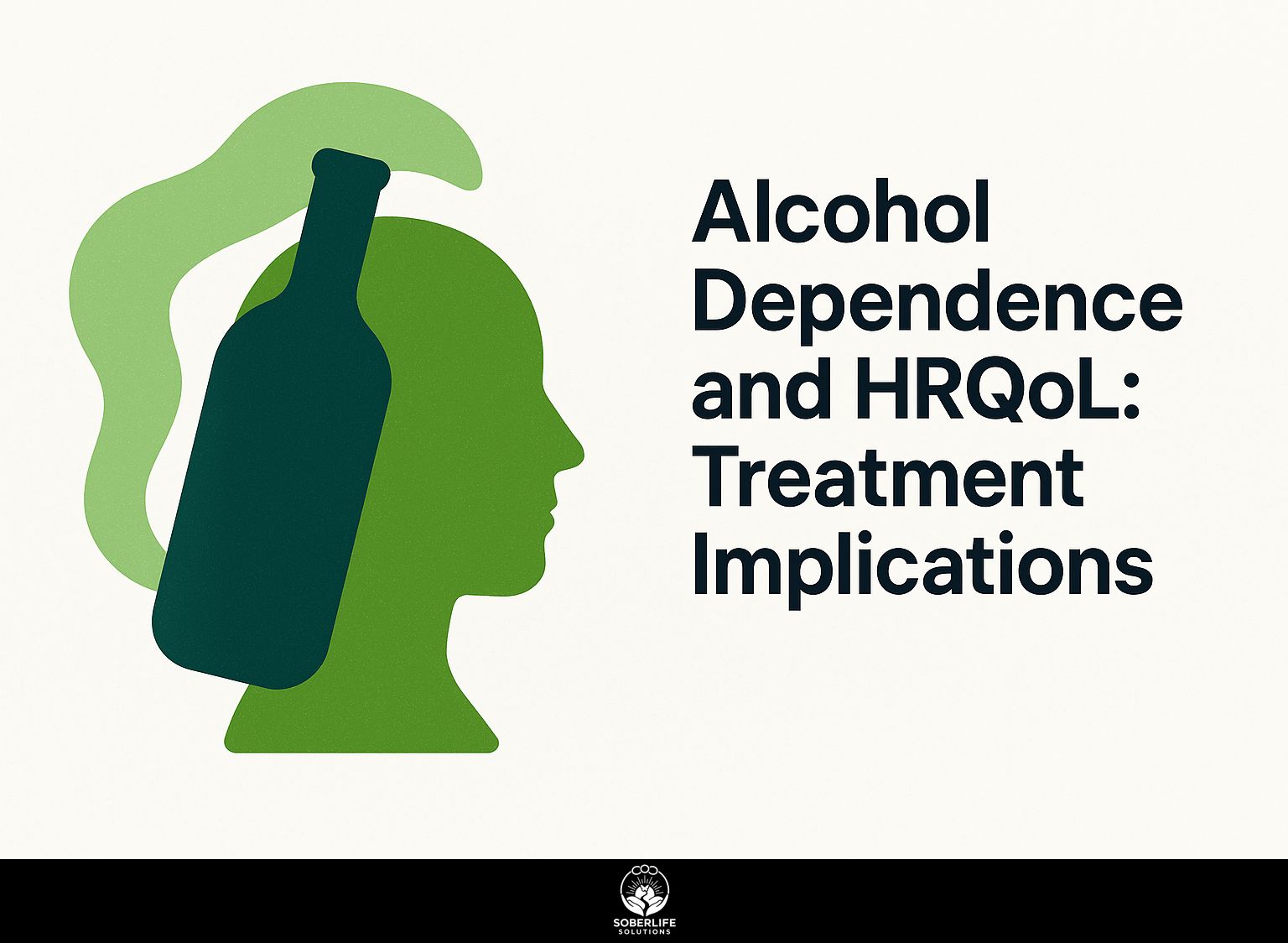
Alcohol addiction greatly reduces quality of life, making effective treatment important for better health and well-being. The WHOQoL-BREF tool measures how alcohol use disorder impacts people, providing information on treatment results. This article looks at the detailed link between alcohol addiction and health-related quality of life, pointing out important treatment effects that can improve overall well-being. Learn how specific methods can improve the lives of those impacted.
Key Takeaways:
Definition and Prevalence
Alcohol use disorder (AUD) is defined in the DSM-IV TR as a pattern of alcohol consumption leading to significant impairment, affecting millions worldwide.
A recent study by the Council of Scientific and Industrial Research in India shows that about 14% of adults have AUD.
This prevalence varies significantly across demographics; for instance, men are more likely to develop AUD than women, with a ratio of nearly 2:1. Younger adults aged 18-25 show higher rates compared to older populations.
Socioeconomic factors, such as income and education levels, also play a critical role in the likelihood of developing AUD, highlighting the need for targeted prevention strategies. This aligns with findings from Our World in Data, which provides a comprehensive analysis of how these factors influence alcohol use disorder prevalence across different regions. For those seeking to enhance recovery methods, exploring how to enhance recovery and vigor in AUD treatment offers valuable insights.
Impact on Daily Life
Individuals with alcohol dependence often face compromised daily functioning, leading to diminished quality of life, as assessed by tools like the WHOQoL-BREF.
Recent studies indicate that 85% of individuals with alcohol dependence report difficulties in maintaining relationships, primarily due to mood swings and erratic behavior. Research published in ScienceDirect highlights the acute effects of alcohol on social cognition, which can further complicate social interactions for those affected.
Health complications often include liver disease and cardiovascular issues, which further exacerbate daily challenges.
A correlation exists between increased alcohol use and lower overall life satisfaction, with a notable 30% decrease in mental health scores among heavy drinkers.
Methods like cognitive behavioral therapy and support groups can significantly improve a person’s life, leading to healthier relationships and daily routines.
Health-Related Quality of Life (HRQoL) Explained
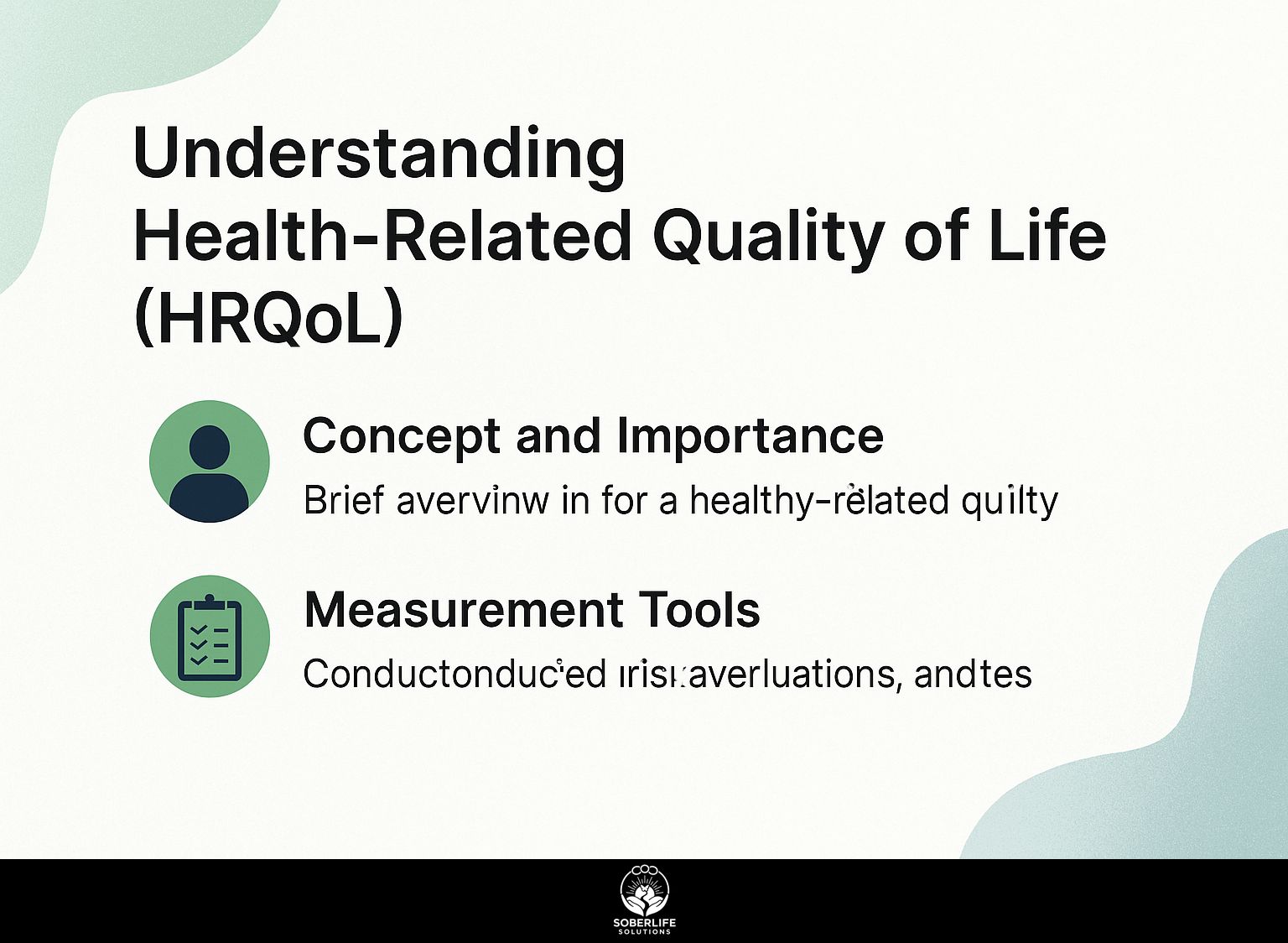
Health-related quality of life (HRQoL) is important for knowing the general well-being of patients with alcohol dependence and can be assessed using standard tools.
Concept and Importance
HRQoL assessments reveal how health affects an individual’s daily functioning and emotional well-being, emphasizing the need for targeted interventions.
Knowing about HRQoL is important for creating successful treatment plans for patients with alcohol dependence. For instance, using tools like the Short Form Health Survey (SF-36) helps clinicians identify areas where patients struggle most, such as physical health or social functioning.
These findings help create individual approaches, like adding counseling services or support groups to improve social connections. HRQoL data can help policymakers create detailed rehabilitation programs that cover both medical and social aspects of alcohol recovery.
Measurement Tools
Various standardized tools, such as the WHOQoL-BREF and EQ-5D, are used to measure HRQoL effectively for individuals undergoing treatment for alcohol use disorders.
The WHOQoL-BREF assesses quality of life across four domains: physical health, psychological health, social relationships, and environment. It’s particularly useful in clinical settings to track changes over time.
The EQ-5D focuses on five dimensions-mobility, self-care, usual activities, pain/discomfort, and anxiety/depression-providing a simple profile for quick assessments, frequently employed in economic evaluations. ResearchGate features a comprehensive comparison of these HRQoL instruments, providing further insights into their applications.
The SF-6D offers a more complete view of health using six areas from the SF-36, perfect for research studies evaluating health-related quality of life in various groups.
Relationship Between Alcohol Dependence and HRQoL
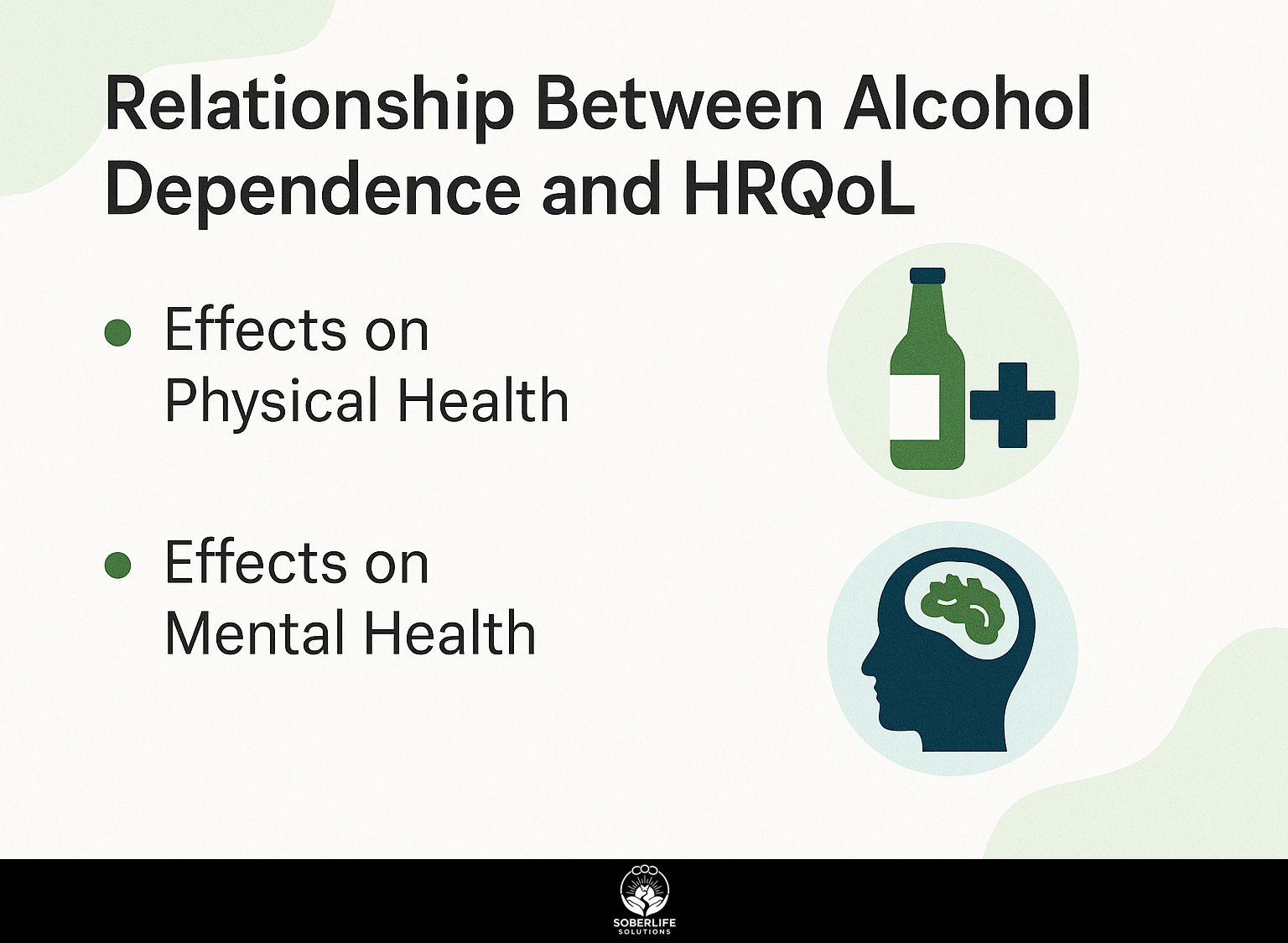
The connection between alcohol addiction and HRQoL shows major drops in both physical and mental wellbeing, requiring thorough strategies for intervention.
Effects on Physical Health
Alcohol addiction can cause serious physical health problems, like liver damage and a higher chance of long-term health conditions.
Research indicates that heavy drinking significantly increases the risk of heart disease, diabetes, and various cancers.
For instance, individuals with alcohol use disorders are twice as likely to develop liver disease compared to non-dependent individuals.
A study found that about 60% of those with alcohol dependence experienced chronic health issues that significantly hampered their health-related quality of life (HRQoL). This decline in HRQoL is often due to the physical symptoms of alcoholism, including fatigue, pain, and malnutrition, which further complicate recovery efforts.
Effects on Mental Health
Patients with alcohol dependence experience significant mental health challenges, including psychiatric co-morbidities that exacerbate their overall treatment outcomes.
Research indicates that individuals with alcohol use disorder (AUD) are significantly more likely to suffer from depression and anxiety. For instance, a study published in the Journal of Clinical Psychiatry found that nearly 40% of patients with AUD also met the criteria for major depressive disorder.
This dual diagnosis complicates treatment, often leading to a cycle where one condition worsens the other. To address these interconnected issues, integrated treatment approaches that simultaneously target both AUD and mental health disorders have shown promising outcomes, improving overall health-related quality of life (HRQoL). Related insight: Co-occurring Disorders: Definition, Challenges, and Treatment can provide more understanding of these complex conditions.
Treatment Approaches for Alcohol Dependence
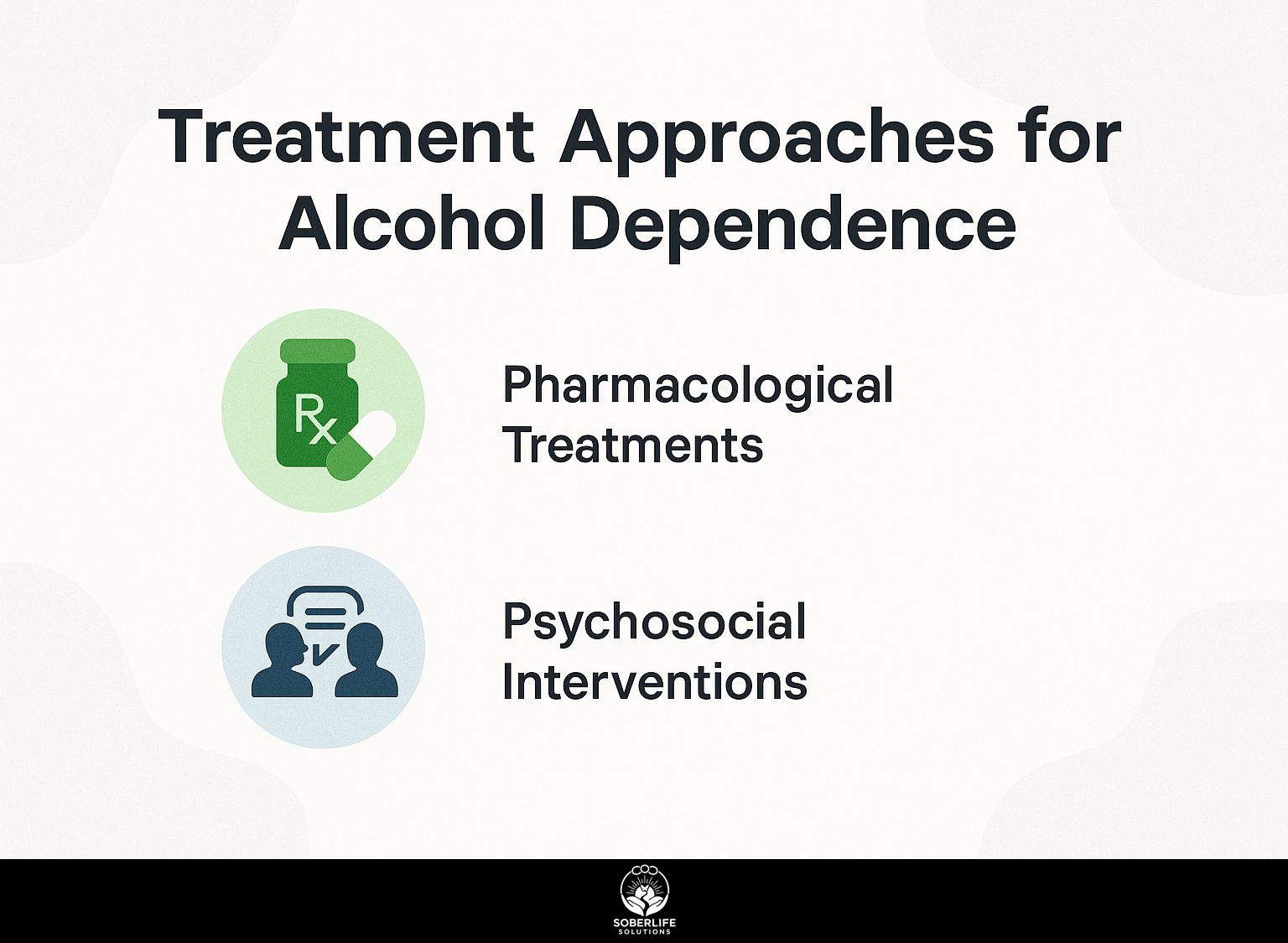
Effective treatment for alcohol dependence includes different medications and therapy methods focused on helping patients get better. I recently came across this detailed exploration of therapies for alcoholism that highlights the techniques and benefits in recovery.
Pharmacological Treatments
Pharmacological treatments such as Naltrexone and Acamprosate have been shown to aid in the recovery from alcohol dependence by reducing cravings and withdrawal symptoms.
Naltrexone works by blocking opioid receptors, which diminishes the rewarding effects of alcohol, thus reducing cravings. Research shows that patients using Naltrexone are 40-50% less likely to relapse than those in placebo groups.
Acamprosate helps to correct the brain’s chemical imbalance caused by alcohol. Research indicates it can raise the chances of staying sober by 25%.
Using both medications with behavioral therapies greatly improves the health and quality of life for users.
Psychosocial Interventions
Psychosocial interventions, such as counseling and family support programs, are very important in helping people recover from alcohol dependence.
These actions help build strong relationships, aiding people in dealing with their problems. Alcoholics Anonymous (AA) shows this method by offering peer support through meetings that build accountability and shared experiences.
Cognitive Behavioral Therapy (CBT) is another effective method, equipping individuals with coping strategies to manage triggers and cravings. Family therapy can strengthen the support network, improving awareness and communication among relatives.
Together, these strategies help maintain sobriety and greatly improve the health and well-being of individuals, showing their key role in complete treatment plans.
Implications for Improving HRQoL
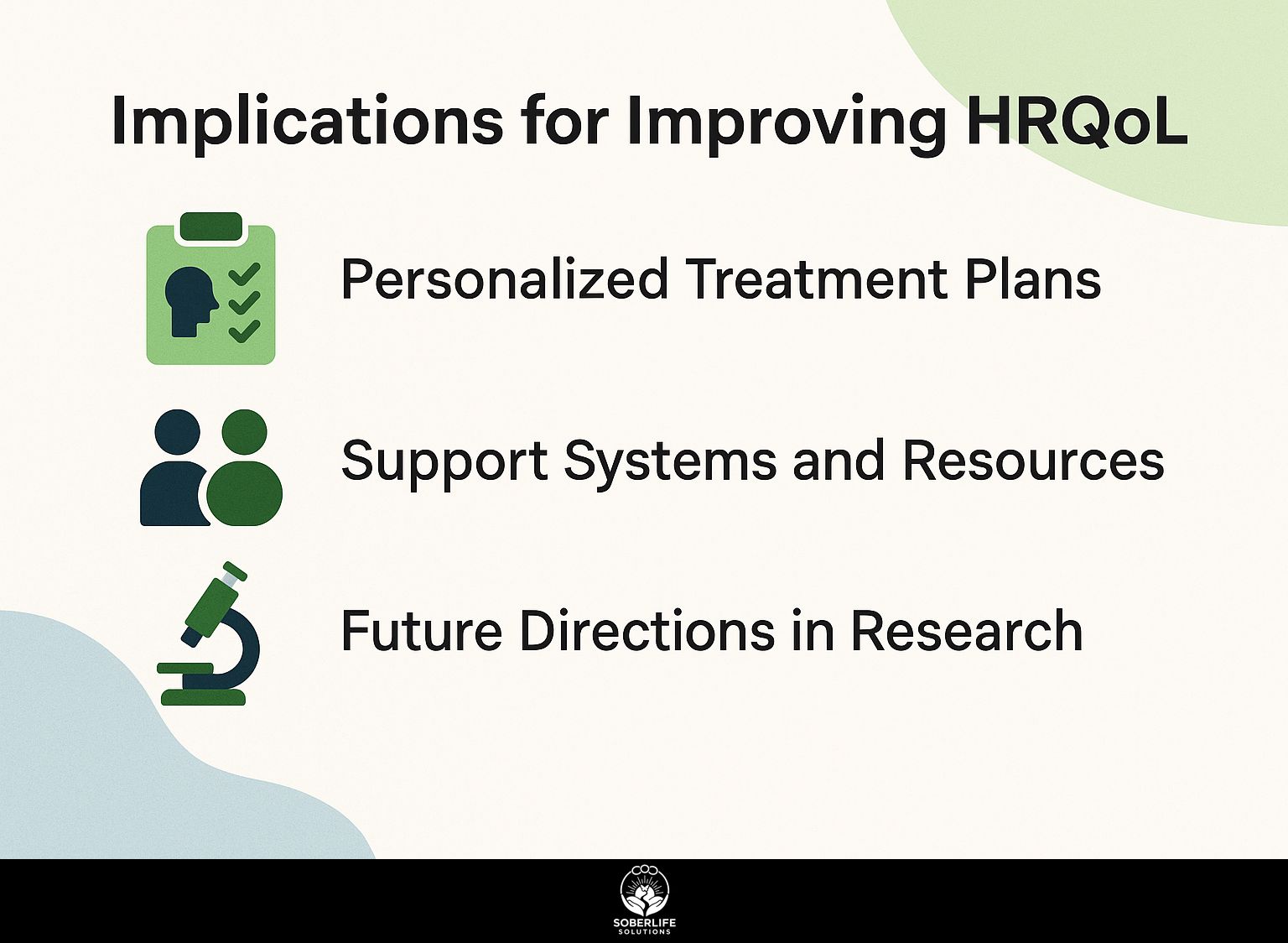
Improving the quality of life for people with alcohol dependence needs treatment plans designed for each person that focus on both physical and social factors.
Personalized Treatment Plans
Individual treatment plans are essential for addressing the unique needs of patients with alcohol use disorders, significantly improving treatment outcomes.
To create personalized treatment plans that work well, clinicians should use detailed assessment tools such as the Alcohol Use Disorders Identification Test (AUDIT) or the CAGE questionnaire. These tools find out how serious the disorder is and check for any other mental health problems happening at the same time.
After the evaluation is finished, it’s important to customize actions according to personal aspects, such as motivation levels and support networks.
For example, a patient with good friends and family support might gain from group therapy, while someone with intense social anxiety might do better with individual counseling.
Support Systems and Resources
Strong support systems, such as involvement from family and help from community resources, are essential for improving recovery from alcohol dependence and increasing health-related quality of life.
Joining support groups such as Alcoholics Anonymous (AA) or Smart Recovery can provide people with emotional and social support.
Using online forums such as Reddit’s r/stopdrinking lets people share their stories while staying anonymous. Family therapy can involve loved ones, helping to create a supportive environment.
Programs like Al-Anon offer resources specifically for families, helping them to support recovery efforts effectively.
Using these varied resources promotes responsibility and creates a community feeling that is essential for lasting recovery.
Future Directions in Research
Research on alcohol addiction should focus on finding new treatments and studying their effects on health and life quality in clinical trials.
Research should look into new treatment methods like mindfulness-based programs, which have shown potential in helping people with alcohol dependence become more psychologically resilient.
Using mobile health apps allows for real-time tracking of health-related quality of life (HRQoL) data, improving data collection.
Assessing how these new programs affect the economy is important to explain why they need financial support. For instance, one of our most insightful case studies demonstrates the impact of patient engagement models on enhancing quality of life (QoL) during recovery, which is critical for securing funding.
Starting with small studies to measure effectiveness and economic value can lead to larger trials, eventually improving care focused on patients.
Frequently Asked Questions
What is alcohol dependence and how does it impact HRQoL?
Alcohol dependence is a chronic condition characterized by a strong craving for alcohol, difficulty controlling consumption, and withdrawal symptoms when not drinking. It can significantly impact an individual’s health-related quality of life (HRQoL) by causing physical, emotional, and social problems.
Are there specific treatment options for alcohol dependence that can improve HRQoL?
Yes, there are many effective treatments for alcohol dependence that improve quality of life. These include medication, behavioral therapy, and support groups. The most effective treatment for an individual will depend on their specific needs and preferences.
How does alcohol dependence affect physical health and overall well-being?
Alcohol dependence can have serious negative effects on physical health and overall well-being. It can damage the liver, cause heart disease, and raise the risk of some cancers. It can also contribute to mental health issues such as depression and anxiety.
What are some ways to address the social impact of alcohol dependence on HRQoL?
The social impact of alcohol dependence can be significant, as it can strain relationships and lead to isolation and stigma. Getting help from family and friends, joining a support group, and talking with a therapist can all help with the social challenges of alcohol dependence and make life quality better.
Can alcohol dependence be cured and how does that affect HRQoL?
There is no known cure for alcohol dependence, but it can be successfully treated and managed. Treatment can greatly improve HRQoL by reducing the negative impact of alcohol on an individual’s physical and mental health, as well as their relationships and overall well-being.
What are some self-care strategies that can improve HRQoL for individuals with alcohol dependence?
Self-care is an important aspect of managing alcohol dependence and improving HRQoL. This can include maintaining a healthy diet and exercise routine, practicing stress management techniques, and engaging in enjoyable activities that do not involve alcohol. Getting help from a therapist or joining a support group can be helpful.

